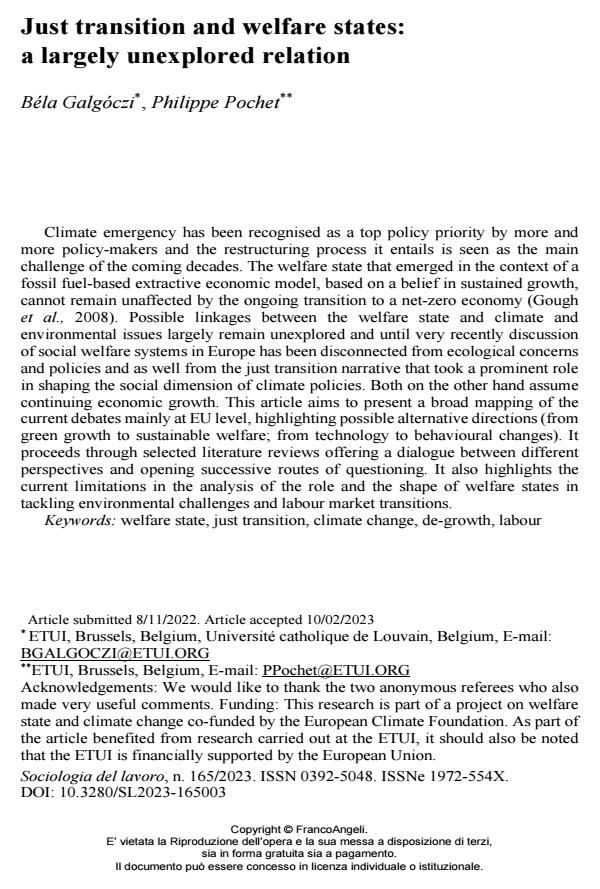Just transition and welfare states: a largely unexplored relation
Journal title SOCIOLOGIA DEL LAVORO
Author/s Béla Galgóczi, Philippe Pochet
Publishing Year 2023 Issue 2023/165
Language English Pages 22 P. 46-67 File size 233 KB
DOI 10.3280/SL2023-165003
DOI is like a bar code for intellectual property: to have more infomation
click here
Below, you can see the article first page
If you want to buy this article in PDF format, you can do it, following the instructions to buy download credits

FrancoAngeli is member of Publishers International Linking Association, Inc (PILA), a not-for-profit association which run the CrossRef service enabling links to and from online scholarly content.
Climate emergency has been recognised as a top policy priority by more and more policy-makers and the restructuring process it entails is seen as the main challenge of the coming decades. The welfare state that emerged in the context of a fossil fuel-based extractive economic model, based on a belief in sustained growth, cannot remain unaffected by the ongoing transition to a net-zero economy (Gough et al., 2008). Possible linkages between the welfare state and climate and environmental issues largely remain unexplored and until very recently discussion of social welfare systems in Europe has been disconnected from ecological concerns and policies and as well from the just transition narrative that took a prominent role in shaping the social dimension of climate policies. Both on the other hand assume continuing economic growth. This article aims to present a broad mapping of the current debates mainly at EU level, highlighting possible alternative directions (from green growth to sustainable welfare; from technology to behavioural changes). It proceeds through selected literature reviews offering a dialogue between different perspectives and opening successive routes of questioning. It also highlights the current limitations in the analysis of the role and the shape of welfare states in tackling environmental challenges and labour market transitions.
Keywords: welfare state, just transition, climate change, de-growth, labour
- Three pillars of just transition labour market policies Jing Ding, Tuuli Hirvilammi, in Contemporary Social Science /2024 pp.244
DOI: 10.1080/21582041.2024.2316656 - Islamic finance and welfare economics: normative Islamic welfare state versus positive Islamic finance mechanisms Islam Kamal, in Qualitative Research in Financial Markets /2025
DOI: 10.1108/QRFM-03-2025-0092 - La giusta transizione tra questione sociale e questione ambientale: il potenziale ecologico delle mobilitazioni operaie Emanuele Leonardi, in GIORNALE DI DIRITTO DEL LAVORO E DI RELAZIONI INDUSTRIALI 177/2023 pp.99
DOI: 10.3280/GDL2023-177007 - Just transitions, trade unions and the need for a new (European) eco-social contract Bianca Luna Fabris, Jane Parker, Valeria Pulignano, in Global Social Policy /2025 pp.186
DOI: 10.1177/14680181241312003 - Eco-Welfare and the Energy Transition Lorenzo De Vidovich, pp.139 (ISBN:978-3-031-55027-0)
- Unconditional basic income and a degrowth transition: Adding empirical rigour to radical visions Nicholas Langridge, in Futures 103375/2024 pp.103375
DOI: 10.1016/j.futures.2024.103375
Béla Galgóczi, Philippe Pochet, Just transition and welfare states: a largely unexplored relation in "SOCIOLOGIA DEL LAVORO " 165/2023, pp 46-67, DOI: 10.3280/SL2023-165003